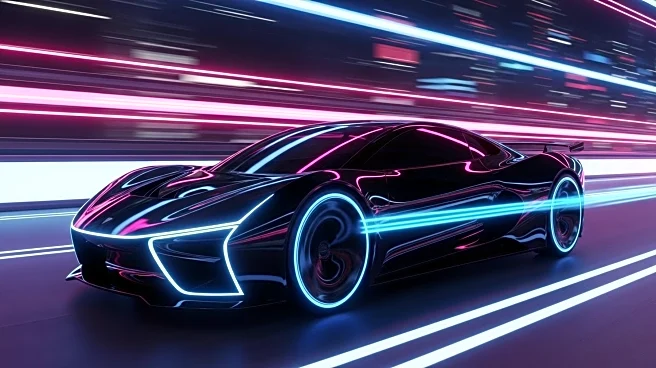What's Happening?
BYD has announced that its Yangwang U9 Xtreme model has set a new top speed record for production cars, reaching 496.22 km/h (308.37 mph). This achievement follows the car's recent record-setting EV top speed of 472.41 km/h. Additionally, the U9 Xtreme set an EV lap record at the Nürburgring with a time of 6:59.157. The car's performance was limited by its 500 km/h-rated tires, indicating potential for even higher speeds. The vehicle features advanced technology, including a double-layer cooling structure and a 30C discharge rate battery, which contribute to its high performance. These innovations may influence future developments in EV technology, particularly in battery efficiency and cooling systems.
Why It's Important?
The Yangwang U9 Xtreme's record-breaking performance highlights significant advancements in electric vehicle technology, potentially influencing the broader automotive industry. The car's advanced cooling and battery systems could lead to improvements in mainstream EV models, enhancing reliability and efficiency. This development may also shift perceptions of EVs, countering skepticism about their performance capabilities compared to traditional fossil-fueled vehicles. As these technologies are adapted for wider use, they could accelerate the transition to electric vehicles, impacting consumer choices and environmental sustainability.
What's Next?
BYD's technological advancements in the Yangwang U9 Xtreme may lead to further innovations in EV design and performance. The company could explore the development of faster charging solutions, such as the Megawatt Flash Charger, to complement the vehicle's capabilities. Additionally, improvements in active suspension systems and energy recovery technologies might be integrated into more accessible models, broadening their impact. The automotive industry will likely monitor these developments closely, as they could set new standards for EV performance and influence future market trends.
Beyond the Headlines
The Yangwang U9 Xtreme's achievements may have broader implications for the automotive industry, particularly in terms of technology transfer. The advancements in cooling and battery systems could lead to more efficient and reliable vehicles, especially in extreme conditions. This could also drive innovation in energy recovery systems, potentially reducing the environmental impact of vehicle production and operation. As these technologies become more mainstream, they may contribute to a shift in consumer attitudes towards electric vehicles, fostering greater acceptance and adoption.









